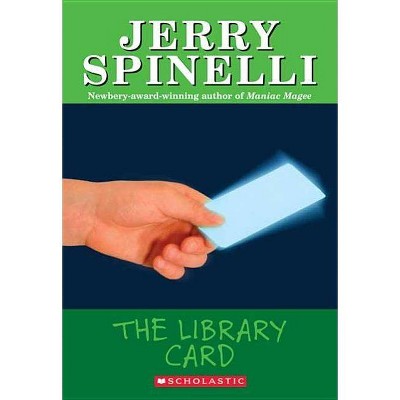April's book (I am not reading much these days) was The Library Card by Jerry Spinelli, which I got from a thrift store since I loved his Maniac Magee. Instead of a novel, it's a series of short stories about children/teens who have their lives changed by a magical library card that seems to follow them around, and by the public library or a bookmobile. Two of the teens (boys) are troubled, while one girl makes an unlikely friend, and another learns that her television addiction is keeping her from living life. The TV story was my least favorite. The adult up-in-arms anxiety about television rotting kids' minds or holding them in thrall is so outdated, even in the mid-nineties when Spinelli wrote this book. TV has been around since the late 1940s, for pete's sake. The internet/world wide web (since it's the nineties) should be the focus of that concern, if you must have one. Books are healthier for children to engage with than television, overall, but I'd rather have kids watching good television shows than reading crap like Twilight. Adults are always scared of the newest media, but the TV isn't even new anymore. It's silly and a waste of time to write stories like this. Your life isn't going to end because you watch a lot of TV. Just make sure your kids aren't watching trash and they'll be fine. 3.5 out of 5 stars, with half a star off because of the sadness and TV-scare nonsense. Giving away. Trigger warnings for this book: violence, teen character beats up a child and breaks things, a character attempts to hold up a vehicle and threatens to hurt others with a knife, mental illness, character has history of self harm and has visible scars on her arms, anger issues, homelessness, shoplifting, vandalism
May's book was a small illustrated hardcover book called The Wandering Goose: A Modern Fable of How Love Goes by Heather L. Earnardt, with lovely illustrations by Frida Clements. This read, which I purchased at the dollar store, is very short. It's a philosophical kind of fable on love and the loss of love. A bug and a goose fall in love, but the goose has to leave to follow his wanderer's heart. I'm 99% sure that the bug and the goose represent the author and a significant other she had. The illustrations and prose are very lovely, but the ending is very abrupt and unsatisfying; it just ends with the bug's heartbreak. I was literally like, that's it? Usually when a character's heart gets broken, I want to read about them reuniting with their lost love, or finding a new love that is better than the one that broke their heart, or picking up the pieces and learning to become a strong independent bug who don't need no goose, but we don't get any of that. I will be giving this one away. 3.5 out of 5 stars. Trigger warnings for this book: none that I can think of, besides the oddness of a bug and a goose falling in love. Don't geese eat bugs?


